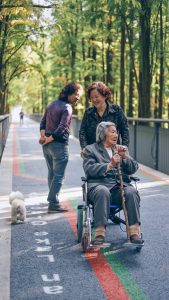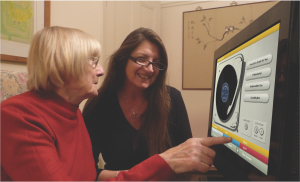This Op-ed first appeared on National Newswatch.
Jean celebrated her 86th birthday in one of Canada’s long-term care homes last week. While she is happy to see her children and grandchildren on the iPad, she’s not entirely sure why more couldn’t be there in person, like they were in the past. Something to do with that virus, for sure. She lost so many friends — some from the long-term care home (LTCH) where she lives and some from her old neighborhood. She’s glad she made it through, and that things are starting to get a bit more back to normal. But she feels like she’s lost a step or two in her ability to move around and she worries she’s going to become increasingly dependent.
 There are many thousands of older adults in LTCHs across Canada like Jean, and the pandemic exacerbated many of their physical, emotional, and cognitive health challenges. Over 80% of deaths in the first wave of COVID-19 occurred in long-term care homes, far out of proportion with the fact that about 1% Canadians live in these settings. Canada has spent hundreds of billions of dollars responding to the pandemic, but the true cost of COVID-19 to Canada’s seniors was paid in lives, not dollars.
There are many thousands of older adults in LTCHs across Canada like Jean, and the pandemic exacerbated many of their physical, emotional, and cognitive health challenges. Over 80% of deaths in the first wave of COVID-19 occurred in long-term care homes, far out of proportion with the fact that about 1% Canadians live in these settings. Canada has spent hundreds of billions of dollars responding to the pandemic, but the true cost of COVID-19 to Canada’s seniors was paid in lives, not dollars.
During the federal election campaign there was talk from all parties about lessons learned and a way forward for Canada’s older adults. But, by and large, the solutions that were proposed focused on short term fixes. What we really need is a complete reimagining of older adult care. Simply adding more beds to a struggling system or providing funding to keep yards tidy won’t address the fundamental gaps in older adult care – both in institutions and in the community. And a disjointed approach, with each province, territory, and community working independently, won’t make the most effective use of funds or ensure the high quality of life older adults deserve wherever they live.
Reimagining care will not be easy, and it will require an investment in research and innovation, but it is the right way to address the real needs of Canada’s older adults. Our representatives in Parliament should come together, across party lines, to stand for real improvements in older adult care, to stand for the importance of research and innovation, and to stand for seniors living their best possible lives.

CABHI funds projects like CIRCA – a multimedia conversation support for people living with dementia and caregivers.
Canada has a strong foundation in health research related to aging, dementia, caregiving, and community engagement, with a history of translating foundational research into solutions that enhance people’s lives. And, unlike our fragmented systems of care, our research and innovation communities know no boundaries. We can and should build on our existing networks — the strong network of Canadian aging research institutes and solution accelerators, including Baycrest’s Rotman Research Institute and Centre for Aging + Brain Health Innovation and the Bruyère Research Institute connected through organizations like HealthCareCAN, that work in partnership to ensure solutions emerging from research can spread, scale, and succeed. Together, these groups can span provincial and territorial borders to develop and implement trustworthy and effective pan-Canadian solutions.
Although, historically, Canada has punched above its weight in terms of aging research and innovation, other countries have started stepping up investment in research in these areas. For example, the Canadian Institutes of Health Research (CIHR) has consistently spent approximately $40M on dementia research over the past several years, in the United States, the National Institutes of Health has increased its funding for dementia research from just under $1B in FY2016 to nearly $2.4B in FY2019. We need critical investments in aging research and innovation to deliver a made-in-Canada approach to aging well that spans the continuum of older adult care.
The pandemic has led to tremendous loss across our country. We must learn from our lessons and be better as a result. We must do better for those among the most vulnerable in this pandemic and the next. We must create a world where we fear no age and where seniors don’t just live longer, they live better. Canadians from coast to coast to coast are demanding it. Canadian researchers and innovators have the will and the ability to make such a world a reality. We call on the newly elected Liberal government to commit to and invest in this vision, so that Jean — and many thousands like her — can celebrate their birthdays in a place that is not just long-term care, but a long-term home.
Dr. Allison B. Sekuler, Vice-President Research Baycrest, and Managing Director of Baycrest’s Rotman Research Institute and the Centre for Aging + Brain Health Innovation
Dr. Heidi Sveistrup, CEO and Chief Scientific Officer of the Bruyère Research Institute and VP Bruyère Research and Academic Affairs at Bruyère Continuing Care,
Paul-Émile Cloutier, President & CEO, HealthCareCAN


